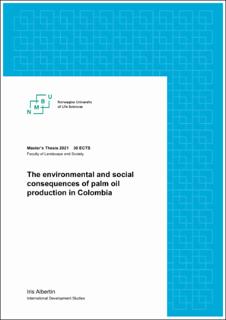| dc.description.abstract | Palm oil production has been steadily growing worldwide since the end of the 20th century and has increased 15-fold between 1980 and 2014 (IUCN, 2021). Besides the main production countries Indonesia and Malaysia, Latin American countries start playing an increasing important role on the global palm oil production market. Colombia is the country in Latin America with the highest production. The growing production rates of the last years have caused a controversial discussion of the consequences of palm oil production such as the deforestation of large areas of tropical rain forest on the one hand but higher yields in terms of plantation sizes and harvests in comparison to other oils such as sunflower or rapeseed oil on the other hand. Recognizing these controversies connected to large-scale oil palm cultivation, this thesis aims to answer the following research question (RQ): What are the environmental and social impacts of palm oil production in Colombia considering the increasing demand for palm oil and how sustainable can be the palm oil production in Colombia?
This case study looks at the consequences of palm oil plantations for the local environment and society in Colombia. As part of this analysis it is important to consider the history of Colombian land disputes and the war with the FARC (Revolutionary Armed Forces of Colombia) guerilla movement. The national palm oil boom has its roots in this civil conflict. Recognizing that palm oil cultivation results in the deforestation of rain forest and other impacts on the environment, questions need to be asked as to what extent the palm oil production can be realized in a sustainable way. To answer the research questions, particular theoretical foundations were chosen and used as the basis of the analysis. As the thesis was written under special circumstances (COVID-19) making field work impossible, the data used for this thesis was drawn predominantly from secondary sources produced by NGOs such as the WWF or the FAO as well as national palm oil organizations such as Fedepalma.
The analysis of the impacts of the palm oil production in Colombia shows that it is a complex issue which has both good and bad environmental and social impacts at the same time. First, I will demonstrate that palm oil production plays an important role when it comes to the creation of jobs. However, as I will also show that the large-scale cultivation of oil palms has undeniable impacts on the environment. Furthermore, I will highlight that vulnerable minorities of the Colombian population have been violently displaced by paramilitaries to clear the land for palm oil plantations. In a conclusion, I argue that we as consumers of palm oil in daily products can indirectly influence the palm oil production and working conditions in the production countries by the consumption choices we make and therefore contribute to sustainability. | en_US |

